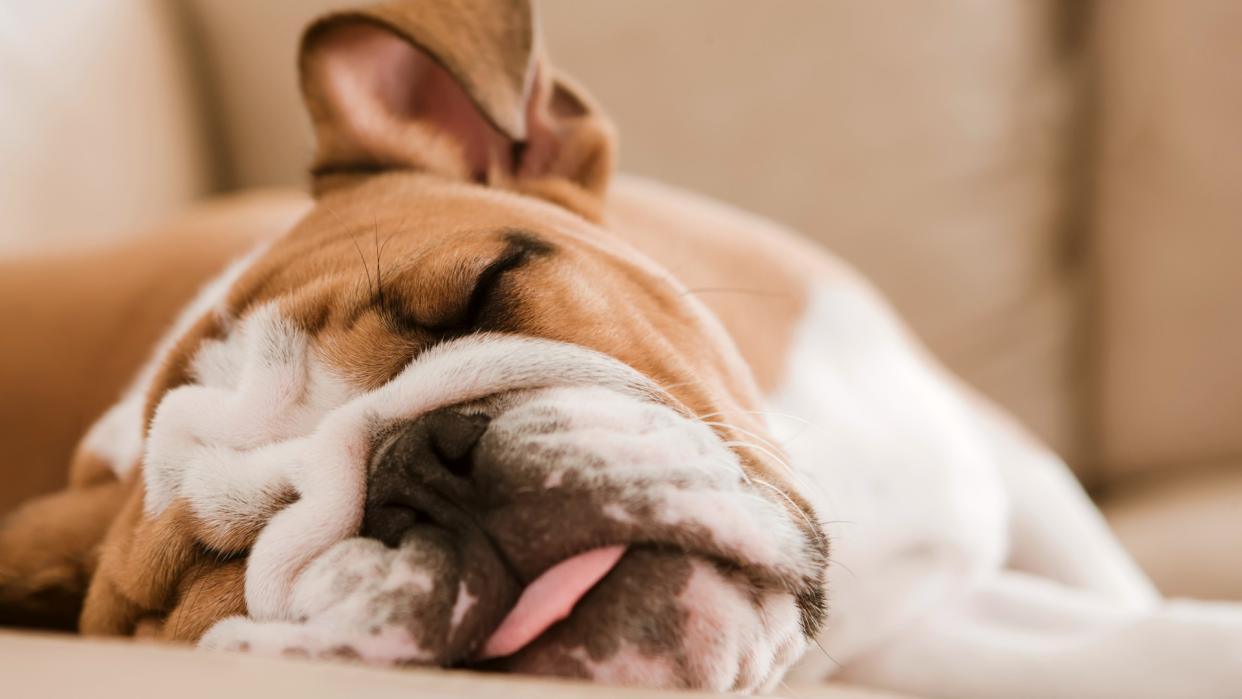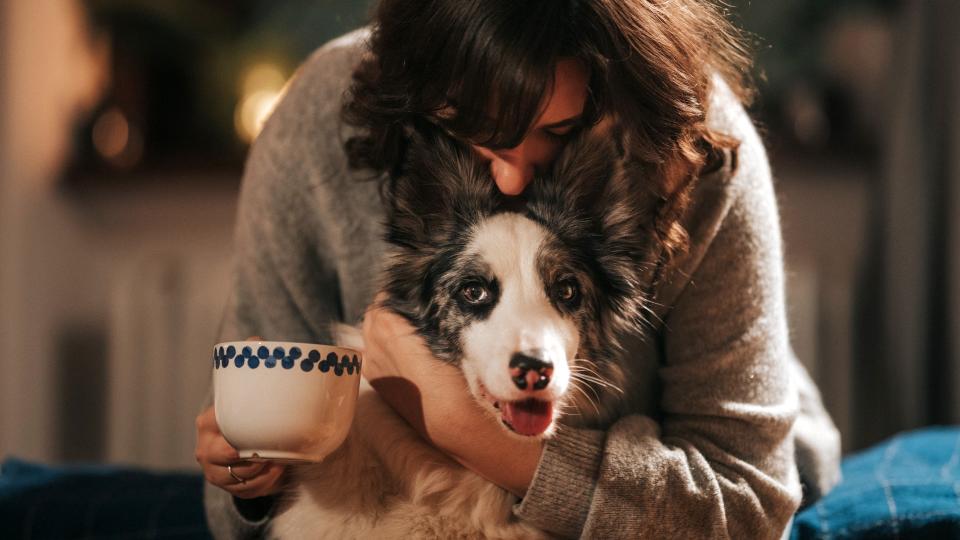How to get your dog to sleep later in the morning

If you have a pup who’s an early riser, you’re probably wondering how to get your dog to sleep later in the morning. Maybe they already snooze in one of the best dog beds in a separate room but wake themselves (and you) up by sleep barking. Or perhaps your little bundle of energy finds its way into your bed during the very early hours, just because.
Either way, your furry friend’s restlessness can influence your own wake-up routine and impact your energy levels throughout the day. As we know, getting lots of good quality sleep isn’t just needed — it’s necessary. The same goes for your dog. A good night’s kip and a reasonable wake-up time will therefore lead to a happier them and a happier you.
To ensure both of you are well-rested, we turned to dog sleep experts for tips that are both straightforward and easy to implement. For example, something as simple as giving their bed an upgrade could make all the difference — especially if they’re a bigger dog breed, as the best large dog beds might be more suitable than just your average offering. Or if your fur friend suffers from injuries or old age, the best orthopedic dog beds could boost comfort levels. We also got to the bottom of why some dogs are early risers. So, if sleep is calling your name, keep scrolling to find out how to unlock the slumber you need.
What time do dogs usually wake up?
There isn’t a simple answer for the right time a dog should (or shouldn’t) wake up. The answer can vary wildly depending on the breed of the dog, the health of the dog, the routine of its owner, and other issues such as disturbances that might be waking them up.
As Chris Socratous from the brand Pets Purest says the age of the dog can also have a factor to play. “Younger dogs may have more energy and be more excitable, making them earlier risers, whereas an older dog less energetic dog may be happier to have a longer lie-in,” he says.
“Other common factors that can influence what time your dog wakes up regardless of their age or breed could include hunger, discomfort, anxiety, or simply the need to go to the bathroom.”
That said, most dogs will usually end up following the same or similar routine to their owners, so with a bit of work you’ll find that they wake up at about the same time as you do — or in some lucky cases, a little while after you’ve already been up and about.
One important thing, however, is to become attuned to your dog’s routine. That way, if they start waking up at a different time from usual, especially if that happens frequently, you’ll be prepared to understand and tackle any problems that might be causing it.
Why does my dog wake up at 4am?

Dogs spend a lot of their time asleep, but that’s no use to you if your furry friend is waking you up at an unfriendly hour every morning. So what could be the reason behind the early wake-up call? Well, according to vet Nick Horniman, MRCVS: “If your dog constantly wakes up at 4am, it could be down to their biological clock, environmental triggers such as loud noises, or even health issues necessitating early morning bathroom breaks.”
So in short? There could be several reasons why your dog is waking up unusually early, and it’s important to think about each one in turn to try and remove the problem. Therefore, give some consideration to the following potential issues:
Toilet: Younger dogs, those with medical issues and older dogs might be waking up as they need to use the bathroom. However, healthy adult dogs should be able to last a night without needing to - make sure they are paying a visit before bedtime to help ensure that they don’t need to go again in the night. Yet to toilet-train your pooch? Learn how to potty train a puppy, according to a vet’s guide.
Hunger: If you feed your dog in the morning only, and they don’t have an evening meal, it could be that they are waking up in the night hungry. You could try a small snack before bedtime — this is a good time to give them one of the best dental chews for dogs, killing two birds with one stone.
Energy: Again, if your dog is walked only in the mornings, they could have excess energy that is waking them in the night. A short walk close to or just before bedtime can help. Learn how often you should walk your dog to really nail your pooch’s energy levels.
Thirst: Make sure your dog always has access to clean, fresh water. If they are crate-trained this might be a bit harder, so make sure they have a drink before you send them to bed. And do check out our guide to the best dog crates and the best large dog crates if you’ve got a larger pooch on your hands.
Anxiety: This is a bit of a broader topic, and there are any number of things that could be causing nighttime waking. There could be a loud noise that is disturbing them, they could be in an unfamiliar environment (for example if you’re on vacation or visiting relatives), or — especially young puppies — they could be suffering from separation anxiety. In some cases, the best calming dog beds can prove ideal for those pups that like having a safe, secure and snuggly spot to sleep in.
Do dogs have a sleep schedule?
The short answer is - yes they do. Usually, a dog’s sleep schedule is reasonably similar to our own, and you’ll generally find that most dogs adapt quite well to their owner’s sleep patterns as dogs can be flexible.
“They tend to sleep multiple times over a 24-hour period but will often mimic the schedule of their owners,” Horniman says. “It is important that dog owners provide a consistent daily schedule, including regular exercise, feeding patterns and bedtime to help stabilize their dog's sleeping patterns.”
You might be wondering ‘why is my dog sleeping so much?’. But most dogs will spend at least half of their day asleep, which includes the main overnight deep sleep, and lighter, shorter naps throughout the day. Keeping your dog to at least roughly the same sleep schedule with the same bedtime and wake-up time every day will generally be a happier experience for both of you.
How to get your dog to sleep later
If you find that your dog is waking up super early and you don’t want them to, if you’ve eliminated all the problems above there are still some things you can do to help.
1. Draw the curtains
Just like humans, dogs are attuned to the light when it comes to waking up. Making sure that wherever they sleep is cozy and dark will help them not to wake up too early, especially in the months when the sun rises very early. Draw the curtains or close the blinds if you can to prevent too much natural light from getting in.
2. Get into good habits
Dogs are creatures of habit, too. If your dog is persistently waking at 5am and you respond to it, the dog quickly learns that that’s the correct time to get up. It can be difficult, but try your best to ignore your dog if they wake up early — often they will simply drop off back to sleep. Eventually, you’ll usually find that they learn to only get up at the appropriate time - i.e. when you do. And if you kip with your pooch in the same room, it could be time to learn how to get a dog to sleep in a different room. Or if you’re questioning should your dog sleep in your bed, do see what experts had to say. Who knows, it might just be the answer to these early morning rises.
3. Learn their signals
It’s important to learn your dog’s distress signals (such as if they need to use the toilet) however. That’s usually characterized by persistence and is something most dog owners become attuned to over time.
4. Serve their breakfast later
It’s also advisable not to feed your dog immediately after waking. That way, they’ll learn to associate waking up with food - and it can be another reason why they want to disturb your sleep before you’re ready.

